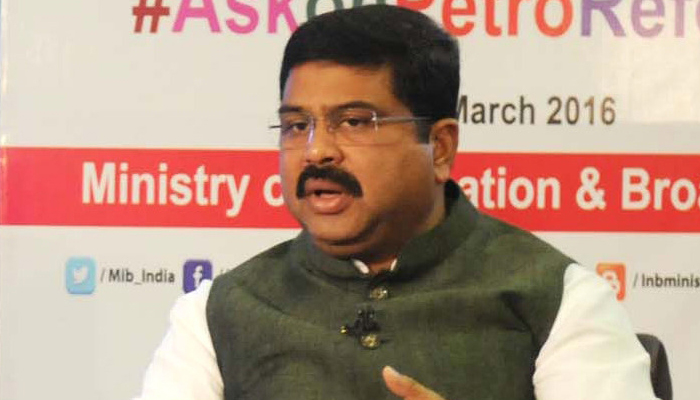TRENDING TAGS :
Petrol and diesel prices to change daily from Friday
New Delhi: The hurdles have been cleared for India to switch over from Friday to the daily pricing mode for transport fuels in line with global rates as petroleum dealers have withdrawn their call for closure of vends on June 16.
The petroleum dealers withdrew their call to go on strike after the government agreed to their demand that the price announcement would be daily made at 6 a.m. instead of midnight.
Petroleum Minister Dharmendra Pradhan told reporters here on Wednesday that the dealers were agreeable to the new timing and the countrywide daily revision of petrol and diesel prices from June 16 as decided.
At present, the state-run oil marketing companies (OMCs) review and revise retail fuel prices every fortnight on the basis of global crude oil prices, while the revision takes effect from midnight. Dealers had represented for a change in timing as under the new regime they would have to deploy manpower everyday to change rates at mid-night.
"There were some practical difficulties which we have addressed in our meeting with leadership of all the three petroleum dealers association today (Wednesday). Daily prices will change from 6 a.m.," Pradhan said.
Also Read: Petrol and Diesel prices to be revised daily from June 16
Federation of All India Petroleum Traders (FAIPT) President Ashok Badhwar said they were withdrawing their call for the protest closure of vends on Friday because the government had taken the decision of daily price revision in public interest.
"And in public interest, we are also withdrawing 'No Sale No Purchase' agitation planned for June 16," he said.
Daily revision of retail selling prices (RSP) has already been implemented on a pilot basis in Udaipur, Jamshedpur, Visakhapatnam, Chandigarh and Puducherry from May 1.
After the success of the five cities pilot, Indian Oil Corp (IOC), Hindustan Petroleum Corporation and Bharat Petroleum Corporation have now decided to implement it across the country.
"This move will ensure that the benefit of even the smallest change in international oil prices can be passed down the line to the dealers and the end-users," Indian Oil said in a statement here.
The FAIPT had earlier voiced concern about the impact of dynamic pricing on dealers' margins.
"Dealers of five cities where it was launched have already burnt their fingers. They are crying at the inventory loss that they have already suffered due to the fluctuations in the daily changing prices," FAIPT said in a statement.
On Tuesday, IOC sought to reassure dealers on their concerns about inventory loss due to the daily revision of fuel prices, even as the Delhi Petrol Dealers Association said it will join the protest closure of pumps on Friday.
"The fear of dealers about inventory loss is unwarranted as the change of prices will happen both upwards as well as downwards, and thus both gain and loss would compensate each other," IOC said in a release here.
All 26,000-plus, Indian Oil dealers will be given timely information on the effective prices for the day.
"At a large number of Indian Oil's 10,000 automated fuel stations, daily price can be automatically updated centrally. Besides, technology also provides for scheduling the price change at midnight," it said.
The Delhi Petrol Dealers Association said on Tuesday that the automation system installed by oil companies at most of the pumps in the capital are "not supporting the automatic price change in the dispensing machine".
"Unless the price is pushed automatically through the automation system, the petrol dealers are not ready to do it manually or fetch the price on a daily basis as being advised by the oil marketing companies."
"This manual intervention can lead to errors and delays in operation of the petrol pump," it said.
India has opted for dynamic pricing, which is practised in many developed countries, owing to the recent volatility in global crude oil prices.
Though oil prices had earlier fallen by more than 50 per cent in less than two years, from levels of over $120 a barrel, output cuts implemented by OPEC and non-OPEC producers this year have brought volatility in crude prices. These continued on their downward spiral following the OPEC cartel's decision last month to extend output cuts.
The Indian basket of crude oils closed below the psychologically important $50-a-barrel mark last week as geopolitical tensions in the Middle East raised market concerns.
According to official data, the Indian basket, comprising 73 per cent sour-grade Dubai and Oman crudes and the balance in sweet-grade Brent, closed trade on Tuesday at $47.23 for a barrel of 159 litres.
With IANS Inputs



